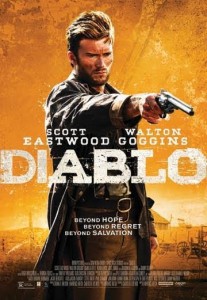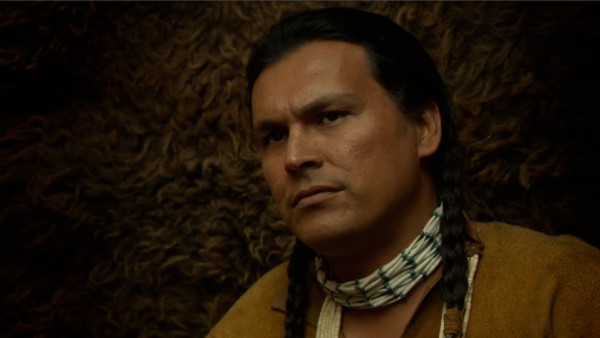Diablo is the new Western-thriller starring Scott Eastwood and Walton Goggins and is currently playing in select theaters and available on VOD and iTunes. Directed by Lawrence Roeck, the film centers on a man who ventures forth to reclaim his kidnapped wife as he journeys through the post-Civil War west. Co-star Adam Beach spoke with us about his supporting role in the film and what it was like being a part of this dark and at times disturbing take on the classic rescue/revenge genre.
SYNOPSIS: A young Civil War veteran named Jackson wakes up to find his beautiful wife kidnapped by a band of ruthless bandits. With killers around every corner, the lines begin to blur between who the good and the bad are, including Jackson. As a final gunfight looms for our hero and he is asked to risk it all to save the woman he loves, this action-packed western takes twists and turns that will break even the hardest of hearts. – Momentum Pictures
How did you wind up being a part of Diablo?
Adam Beach: Scott Eastwood is a good friend of mine. He called me up and said, “Hey, do you want to help me out with this movie?” and I said, “Of course dude, that’s what friends are for. I don’t have to read the script if you’re in it. It’s all good.” He said, “Nah, you’ve gotta read the script.” I showed up on set and finally read the script and said, “Dude, this is a freakin’ good ass movie.” I said, “Y’know, you can’t tell anybody about the ending of the movie ’cause that’ll ruin the whole buildup of your character.” And he agreed, so we’ve been tight-lipped ever since.
Was it the twist in the script that got you interested?
AB: I just love that the script slowly reveals who Scott’s character is and. how he’s affected by everybody around him, but he has this psychological warfare going on in his mind. When it comes to my character being the American Indian, we bring him in to heal his wounds; not only physical, but spiritual also. For us as Native American people, that’s who we are.
We respect being human beings, but also the natural and spiritual world and I thought that came across wonderfully and I hope a lot of people get a sense of that; not to take away that we also have that warrior spirit. When the two characters meet Scott’s character, they obviously want to kill him because at that time in history the relationship with the American Indians wasn’t that good during the Civil War. Because of him not killing the young boy, it gave us the sense to give that respect back. It explained a lot in its little time on film.
Did you bring anything to the table for your role?
AB: Well to me growing, up I’ve had my own psychological war with my parents dying at such a young age. My mother was killed by a drunk driver, then two months later my father drowned. He was out with his friends drinking and on medication for depression, and he didn’t come out of the water alive. Growing up with sexual abuse and having to be in gangs and dealing with my own trauma; finding the cultural identity when I was 16, and learning those traditional ways saved me from hurting myself. I’m 43 now so those teachings are really close to me when it comes to ceremony and sweat lodges.
I carry two traditional pipes and I sing my songs and pray that us as human beings treat each other with respect. So when it came to trying to portray a connection on screen, that’s what you see. That’s what I’m seeking and Scott’s a real good friend of mine so our chemistry speaks for itself, but how to have a chemistry that have never met before, that’s what I’m implying in there in that I’m seeking to give him these teachings that will in a way give him guidance in his own life and find his own path, however he seeks it.
Who were you and your fellow actors portraying?
AB: We were the Cree Nation, which is a lot of the Cree tribes are up in the Alberta region of Canada. We had thee grandfather of the little boy teaching me the language. He was always right beside me so I was getting him to shout out the language. We had to make sure the dialogue I was speaking when it comes to the translation in English could be a sentence. In the Cree language it could be a longer sentence because that language is very lengthy in ways.
So that was one of the things we really focused on and I kind of wanted to draw out the language also. I asked the director and also, I call him “Smoking Joe,” the linguistic if I could draw it out in a movie style kind of drawl and slow it down a bit. I wanted my character to be at ease in his tipi where it’s like, “This is my home. There’s no concern that this man here injured is gonna harm me.” So I wanted it to be very like non-disturbed because I’m in my peaceful element. That’s kind of how we payed it out and the other boys talk fast, but me I’m kind of in my own place of comfort.
How did you originally get into acting in films?
AB: I think when I started acting it was the first time I got the freedom of expression. I was able to express certain emotions and feelings that I could put into other characters, so it was a good way for me to run away from ho I personally was. I could be a ninja, I could be a pirate or I could be in a play y’know. I found myself finding a new place because I grew up in the city of Winnipeg in one of the worst neighborhoods in Canada at that time in the 80s. I was in gangs and in my backyard was prostitution and seeing drug paraphernalia all over the place.
Acting for me was an escape and it wasn’t until Smoke Signals that made me realize that acting is a personal development and challenge to grow. Smoke Signals really mirrored the way I grew up and how I felt, and that movie was the first time I’d dealt with my parents’ death and how I felt that loss and sadness and anger. After that movie I said, “Y’know what, I have to realistically wear my emotions now when I do a job. That’s gotta be as real as it gets. It’s not just dialogue anymore.”
Do you have any upcoming projects on the way?
AB: I’m currently talking to Lawrence and his writing partner on a new film that gives a new take on the look of the savage Indians back in the day, so we’re hoping that we’ll have something concrete next year. Me and my wife are currently developing a thriller-horror film that deals with the amount of suicides that are plaguing the reservations, so we want to create a film that’s socially meaningful and brings social awareness to the issue of suicide.
Any final words on Diablo?
AB: I think what people are gonna find is that we have a historical trauma when it comes to the past relationships when it comes to Native Americans and the history of how America was created. With this film, it’s nice to see that the trauma is presented from a white male that was in the Civil War and that trauma affects him in a way that still exists.
Those traumas when it comes to the historical past generation to generation; our children, our grandchildren, our future grandchildren learn these behaviors. We have to know that they exist and we have to take care of those traumas and learn to heal from them. This movie shows that perspective from Scott’s character, and I love it. It shows the American Indians as the ones who respect and help out when people are needed. It’s a nice little twist.
Anything else before we go?
AB: Make sure to check out Suicide Squad coming in August, 2016. You will love it.

